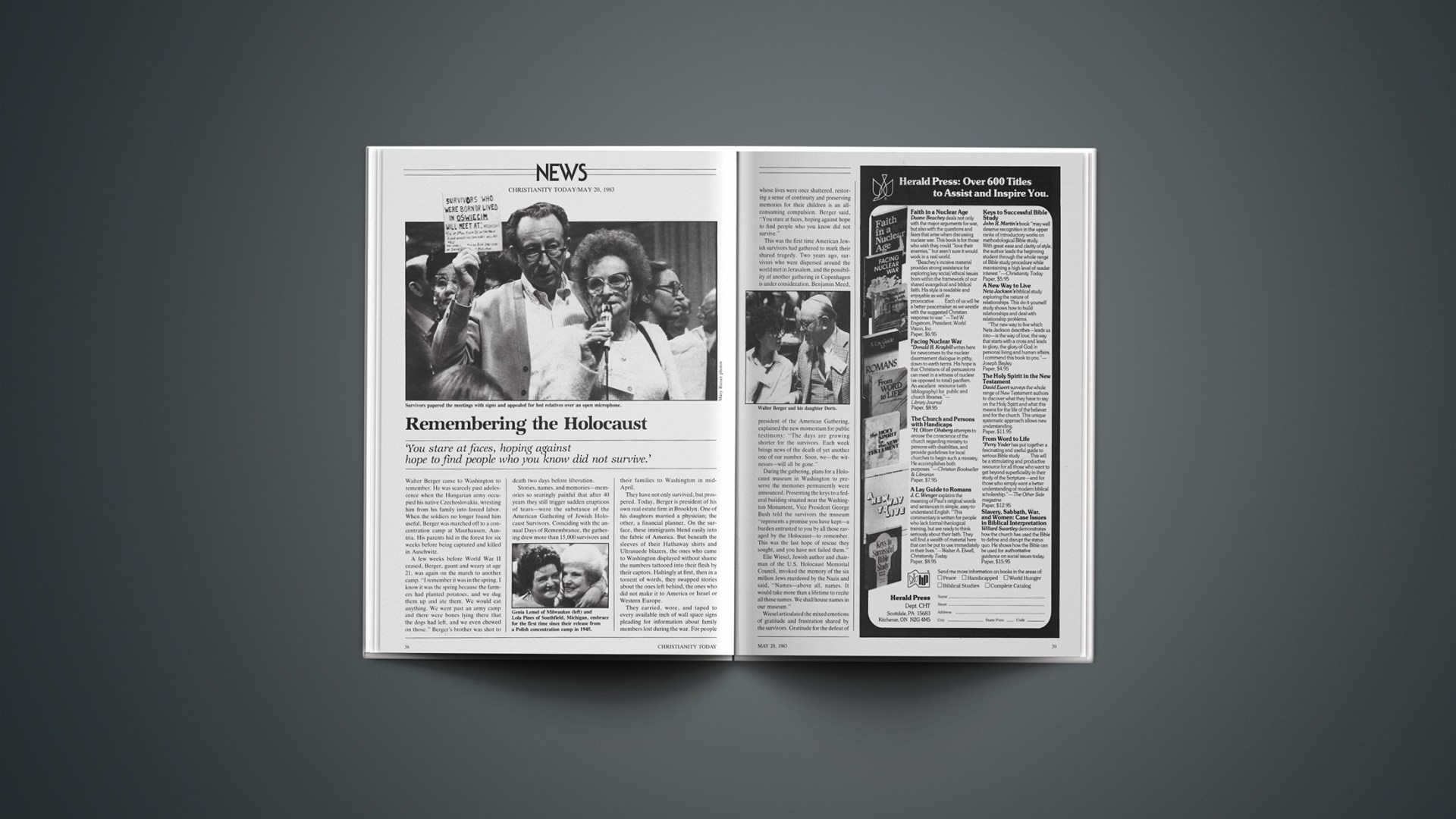‘You stare at faces, hoping against hope to find people who you know did not survive.’
Walter Berger came to Washington to remember. He was scarcely past adolescence when the Hungarian army occupied his native Czechoslovakia, wresting him from his family into forced labor. When the soldiers no longer found him useful, Berger was marched off to a concentration camp at Mauthausen, Austria. His parents hid in the forest for six weeks before being captured and killed in Auschwitz.
A few weeks before World War II ceased, Berger, gaunt and weary at age 21, was again on the march to another camp. “I remember it was in the spring. I know it was the spring because the farmers had planted potatoes, and we dug them up and ate them. We would eat anything. We went past an army camp and there were bones lying there that the dogs had left, and we even chewed on those.” Berger’s brother was shot to death two days before liberation.
Stories, names, and memories—memories so searingly painful that after 40 years they still trigger sudden eruptions of tears—were the substance of the American Gathering of Jewish Holocaust Survivors. Coinciding with the annual Days of Remembrance, the gathering drew more than 15,000 survivors and their families to Washington in mid-April.
They have not only survived, but prospered. Today, Berger is president of his own real estate firm in Brooklyn. One of his daughters married a physician; the other, a financial planner. On the surface, these immigrants blend easily into the fabric of America. But beneath the sleeves of their Hathaway shirts and Ultrasuede blazers, the ones who came to Washington displayed without shame the numbers tattooed into their flesh by their captors. Haltingly at first, then in a torrent of words, they swapped stories about the ones left behind, the ones who did not make it to America or Israel or Western Europe.
They carried, wore, and taped to every available inch of wall space signs pleading for information about family members lost during the war. For people whose lives were once shattered, restoring a sense of continuity and preserving memories for their children is an all-consuming compulsion, Berger said, “You stare at faces, hoping against hope to find people who you know did not survive.”
This was the first time American Jewish survivors had gathered to mark their shared tragedy. Two years ago, survivors who were dispersed around the world met in Jerusalem, and the possibility of another gathering in Copenhagen is under consideration. Benjamin Meed, president of the American Gathering, explained the new momentum for public testimony: “The days are growing shorter for the survivors. Each week brings news of the death of yet another one of our number. Soon, we—the witnesses—will all be gone.”
During the gathering, plans for a Holocaust museum in Washington to preserve the memories permanently were announced. Presenting the keys to a federal building situated near the Washington Monument, Vice President George Bush told the survivors the museum “represents a promise you have kept—a burden entrusted to you by all those ravaged by the Holocaust—to remember. This was the last hope of rescue they sought, and you have not failed them.”
Elie Wiesel, Jewish author and chairman of the U.S. Holocaust Memorial Council, invoked the memory of the six million Jews murdered by the Nazis and said, “Names—above all, names. It would take more than a lifetime to recite all those names. We shall house names in our museum.”
Wiesel articulated the mixed emotions of gratitude and frustration shared by the survivors. Gratitude for the defeat of the Germans, the open arms of most Americans, and national recognition was clouded by a sentiment one rabbi said “has been building up in our hearts for years.”
Wiesel asked, to sustained cheering, “Why did the armies come so late? Why didn’t they bomb the railroads that carried Jews to extermination centers?” Why, he added, is it so popular today to criticize Israel?
Florence Lipsky of Hyattsville, Maryland, believes the gathering was most significant because “it showed the world that the U.S. leadership knows it happened” and has pledged to keep the memory alive. Lipsky’s own indelible memories of persecution reach back only to last November, not to the 1940s.
Her house of worship, Shaare Tefila congregation in Silver Spring, Maryland, was disfigured by an organized hate group. With a tremor in her voice, she recalled the shock of seeing red swastikas, slogans—“Death to the Jude”—and Nazi symbols emblazoned on the temple walls. Heartened by overwhelming community support in the aftermath, Lipsky and her fellow congregants bravely cleaned up and put the incident behind them. But it served as an ominous reminder that human wickedness is not a thing of the past.
BETH SPRING AND MARY RIESER










